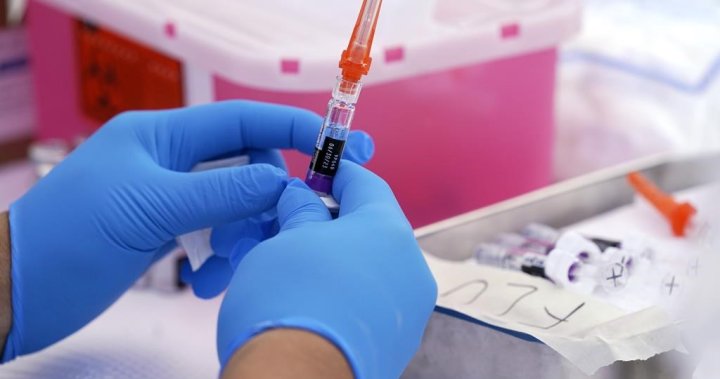Is it too late to get a COVID booster or flu shot before the holidays? What experts say – National | Globalnews.ca
With the holidays fast approaching, Canadians may be looking forward to spending time with their family and friends. But this year, those gatherings are happening on the backdrop of higher-than-normal flu cases and warnings that a rise of COVID-19 cases could be looming.
Dr. Theresa Tam, Canada’s chief public health officer, told reporters during a Dec. 14 news conference that while the nation has passed the peak of the last COVID-19 wave, the new year may bring with it an uptick in COVID-19 activity.
The latest COVID-19 epidemiology update stated that Canada had 16,528 COVID-19 cases for the week of Dec. 4 to Dec. 10, with a decrease in hospital use by COVID-19 patients, but an increase in COVID-19-related deaths.
Read more:
Flu season: Why are so many Canadian children falling sick?
Read More
-
![]()
Flu season: Why are so many Canadian children falling sick?
Meanwhile, the latest FluWatch report shows that a total of 9,393 laboratory detections were reported from Dec. 4 to Dec. 10. Patients aged 0 to 19 currently account for 38 per cent of lab detections, which is the highest proportion among all age groups.
Health experts have been urging Canadians to get their COVID vaccine booters and flu vaccines as these viruses swirl. But is it too late to get them as the holiday nears? Canadians should still get their booster dose or flu shot regardless — even better, as soon as possible, experts told Global News.
Raywat Deonandan, an epidemiologist and associate professor at the University of Ottawa, said “it’s never too late” to get vaccinated, but getting a vaccine later means individuals won’t reap the full effects of the vaccine for two, three or four weeks.
“But you should definitely get one,” Deonandan said. “While you’re waiting for that to kick in, take other precautions, improve your ventilation at home and wear a mask in indoor settings.”

In Canada, while 83.3 per cent of people have received at least one dose of a COVID-19 vaccine as of Dec. 4, only 50.4 per cent of Canadians have received their first COVID-19 booster dose.
The percentage of Canadians who have received a second booster shot of a COVID-19 vaccine is even lower at 21.9 per cent.
Although COVID-19 vaccines do not necessarily prevent COVID transmission, they prevent severe outcomes, said Joan Robinson, a professor at the faculty of medicine and dentistry at the University of Alberta.
Robinson said that within a week, individuals will have more immunity than they had on the day they got the shot.
“Even within a few days, you will probably have some protection,” said Robinson, adding that no one knows absolutely for certain how many days it takes to get substantial protection as effectiveness varies depending on each individual.

As for flu shots, Robinson said people would probably have immunity within seven days of getting a vaccine.
“In fact, if you’ve been immunized before, you may develop immunity even earlier than that, maybe by day three or four,” Robinson said. “The data so far suggests that the flu shot this year is probably a winner and probably does work fairly well.”
According to Health Canada, this season’s flu shot will help to protect Canadians against influenza A(H1N1), influenza A(H3N2) and influenza B.
Dr. Melanie Bechard, a pediatric emergency medicine physician in Ottawa, urges Canadians to get their flu shot and COVID boosters if they haven’t already.
“I’ve seen a lot of suffering in little humans that likely could have been prevented or lessened by receiving the flu shot early on,” said Bechard. “The best time to get the flu shot was a month ago, but the next best time to get it is right now.”
Deonandan said people who are experiencing symptoms should stay away from gatherings and individuals should consider not going to gatherings if they notice other people are symptomatic.
He added that people should use rapid tests before attending events to “reduce the likelihood of a transmission event.”
“Use rapid tests. This is really a criminally underused tool,” Deonandan said. “They’re not perfect and they’re less perfect now, but they’re still very useful.”
— with files from Global News’ Teresa Wright and Aaron D’Andrea
© 2022 Global News, a division of Corus Entertainment Inc.
For all the latest health News Click Here







